Behind the Music Makers: Alums in the Industry Share Stories
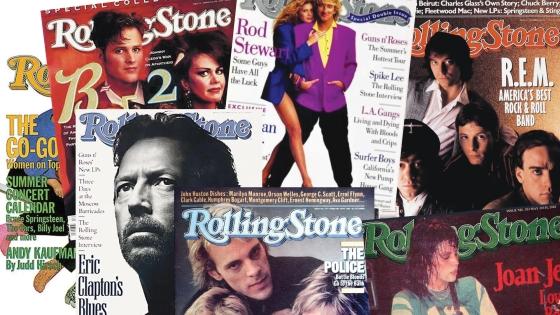
Davidson College alums have worked with some of the biggest names in music. Learn more about the stories behind these Rolling Stone covers in Cover of the Rolling Stone: Davidson Alums Behind the Music Scene.
Before they became professional musical influencers, these guys introduced Davidson College students to upcoming bands who ended up achieving international success. They went on to successful careers in the music business.
Music industry leaders Russell Carter ’75, Bertis Downs ’78, John Huie ’78 will share the inside track from their careers during a panel discussion, “From the Union Board to the Big Stage,” Thursday, April 25, from 11:05 a.m.-12:05 p.m. in the C. Shaw Smith 900 Room, Alvarez College Union.
Terry Hummel ’77, Bertis Downs ’78 and John Huie ’78 served as chairs of the College Union’s Concert Committee, which brought bands like The Police and R.E.M. to campus. Russell Carter ’75 wrote concert and album reviews for The Davidsonian.
Carter is the Indigo Girls’ longtime manager and producer of the 30A Songwriters Festival. (The Indigo Girls will play at Davidson’s new stadium Friday.) Downs served as R.E.M.’s longtime attorney and advisor and is a former adjunct professor of entertainment law at the University of Georgia School of Law. Huie, a music agent and founding partner at CAA Nashville, represents some of the world’s top performers and received a Country Music Association 2023 Lifetime Achievement Award. Hummel served as publisher of Rolling Stone magazine and co-founded Vashon Island Partners, an entertainment sponsorships company whose ventures include producing Eric Clapton’s annual Crossroads Guitar Festival.
Carter, Downs and Huie will visit Davidson during the Common Hour Thursday, April 25, to talk about their careers in the music business. Hummel will not be able to attend, but like his longtime friends, shared a few thoughts about life and music.
Russell Carter ’75
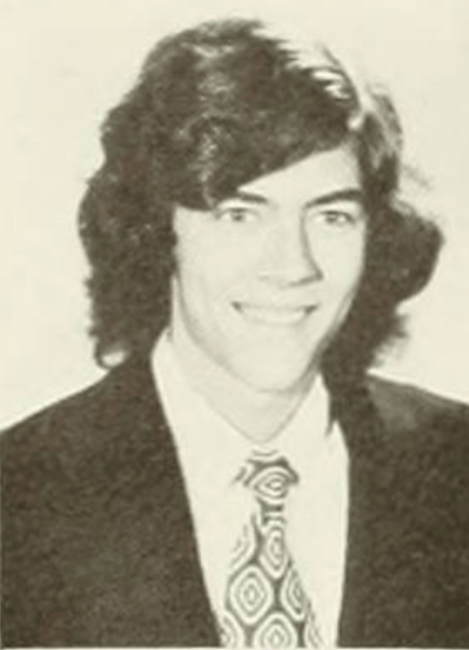
Russell Carter ’75: Then
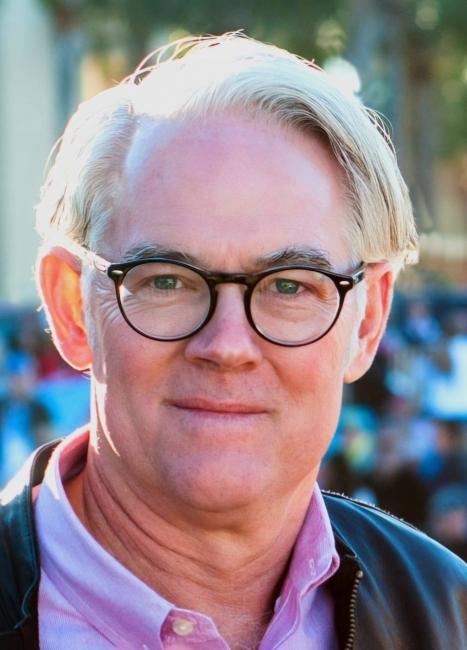
Russell Carter ’75: Now
What’s an important lesson you’ve taken away from your career?
It’s somewhat cliche but for me it has clearly been follow your passion. Music has been a consuming interest of mine since I was a child. When I saw the Beatles on Ed Sullivan and then live in person at the Atlanta stadium, I decided this is what I want to do. I wanted to be part of the excitement music brings.
I had the good fortune to attend UGA law school during a golden era of popular music in Georgia (B-52s, REM, Widespread Panic, Indigo Girls, Black Crowes…) and when I graduated I set up my own law firm instead of finding a salaried job with an established firm. I followed my heart, not my head, and worked with many young, ambitious bands. We didn't know if we could succeed, but we knew we had to try.
Can you tell us more about that lesson?
I like this simple quote from Bob Dylan:
“Life is sad
Life is a bust
All ya can do is do what you must
You do what you must do and ya do it well.”
Sometimes you choose to take on long shot development projects; other times obvious successful and lucrative opportunities fall in your lap. In all cases, you must do your job well no matter how mundane or how fun it can be.
Can you share a story about a singer or band?
People ask me about the Indigo Girls partnership and why is it successful. Here are a couple of things it is not: Amy and Emily do not co-write their songs, they have very different writing styles and points of view. Once they have written songs separately, they arrange their songs together adding harmonies, counter melodies, and instrumental ideas. Amy and Emily were never romantic partners but have been close friends and music partners dating back to high school. They are close like sisters but value their own space as well.
What makes their partnership enduring is their profound respect for each other’s talents. Amy and Emily could have had successful solo careers from the start, but they grasped early on that when they combined their performance strengths and writing skills something quite extraordinary happened. They have never lost sight of that.
Bertis Downs ’78
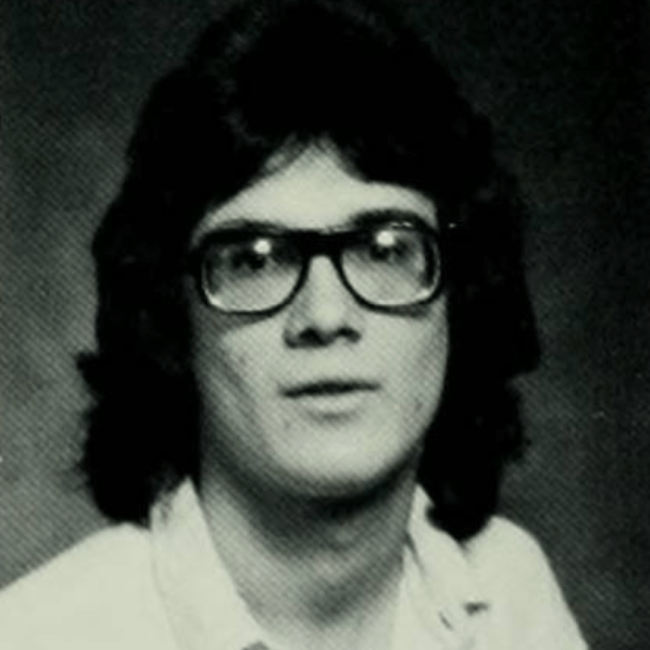
Bertis Downs ’78: Then
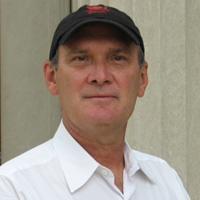
Bertis Downs ’78: Now
What’s an important lesson you’ve taken away from your career?
Turning negatives into positives whenever possible ... figuring out ways to deal with setbacks that are inevitable. A good liberal arts education helped!
Can you tell us more about that?
Back in the early days of the band (R.E.M.) I was driving the van from New York to a show in Washington, D.C., when it broke down on the New Jersey Turnpike in the pouring rain. We had another friend of the band’s car following us, so we packed all five of us and the equipment into this little Toyota and drove to the Trenton train station and just barely caught the train. There were no cell phones, we used a payphone to call the venue and say we’d be late. We got there at 10:30 p.m. for a 9:30 p.m. show, but the band played.
In another instance, the band thought they’d be hired for the musical score of a movie and began writing songs and music in advance. A new director opted to go in a different direction. Rather than get down and out, they realized that they had all these beautiful songs. And those songs turned into the album Automatic for the People.
The band retired 13 years ago, but streaming keeps their music alive for younger generations.
Can you share a story about a singer or band?
In early 1983, when R.E.M. played at Davidson for the second time in three months, bassist Mike Mills had something wrong with his knee. It was painful as hell; so he spent part of the afternoon at the Davidson infirmary. He was cleared to play the show but with a stool as needed. And from what I hear none of that affected the good time had by all at a lively post-show party late into that night.
John Huie ’78
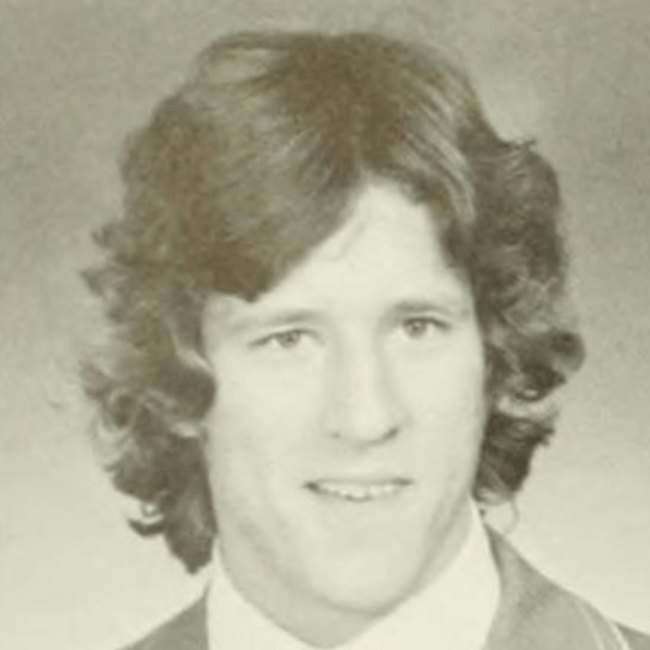
John Huie ’78: Then

John Huie ’78: Now
What’s an important lesson you’ve taken away from your career?
If you want to be Number One, you don’t live a balanced life. Something must give. Choosing the right partner is important to a balanced life. Ying and Yang make a whole.
Can you tell us more about that?
My wife, Dawn, a stay-at-home mom, would always have to call to tell me to get out of the office and get to the kids’ ballgames. My biggest regret is not coaching my kids’ teams.
Can you share a story about a singer or band?
A few years back I was in Atlanta for a show at the Fox Theatre. A buddy said I should stop by the Dixie Tavern on my way home to see this great new band. I begrudgingly did it, walked in at 11 p.m. on a Thursday night to a packed 400-capacity room totally blown away, especially when 400 beer bottles raised on “Chicken Fried.” I said, “Holy cow, this band will play stadiums!” That eventually we did and it has been a wonderful tenure with the Zac Brown Band.
Terry Hummel ’77
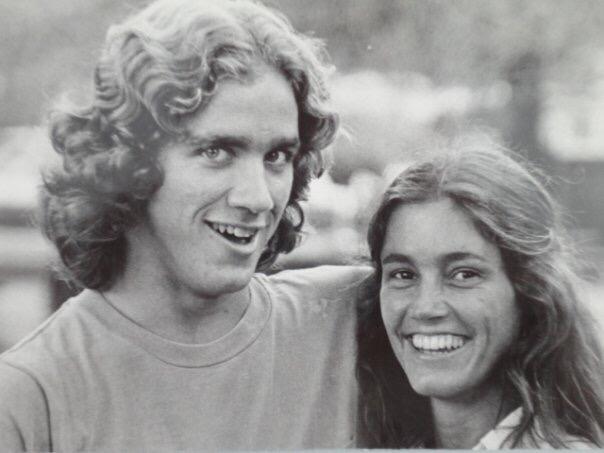
It’s spring 1975, and Terry Hummel and his (now) wife, Maureen, are outside playing catch with a baseball on the quad between Cannon & Watts. This is the first photo of the couple taken together at Davidson.
What’s an important lesson you’ve taken away from your career?
First, be kind and take a genuine interest in the people you work with in whatever career you pursue. Get to know them personally, what they enjoy outside of work — music, art, sports, travel, family, dogs, whatever, but be sure to be genuine. Find areas of common interest and connection. Include everybody, as you never know who you will cross paths with in the future.
The power of music is immeasurable. It connects us, inspires us and celebrates with us. It marks our most important occasions and evokes our most vivid memories.
Can you tell us more about that?
After graduating from UCLA, Michael Ovitz, the founder of the great CAA talent agency with whom John Huie has had such a brilliant career, started out in the mail room at William Morris. Country music legend Martina McBride was once the young girl selling t-shirts in the lobby at Garth Brooks concerts, while eight-time Grammy winner Mark Ronson was a student intern at Rolling Stone magazine. Everybody matters, and you will make some lifelong friends along the journey.
Can you share a story about the power of music?
My mother-in-law, Gertie, had dementia. Gertie lived with us for 3.5 years before she passed in February at 93. Her dementia worsened considerably during that time, to the point that it was unclear if she recognized us. But music always lit a spark in her and instantly refueled her memories. So, I’d pull out my iPhone and play Johnny Mathis, Nat King Cole, and others she loved, and she knew all the words and would sing along.
Last St. Patrick’s Day, a friend in the music biz sent happy holiday wishes to Gertie from The Celtic Tenors, who were performing on Long Island. The Tenors sent a video clip of them singing Danny Boy, and Gertie immediately started singing along. Her ancestral roots were in County Cork, Ireland, and she instantly and vividly recalled singing Danny Boy for the nuns in her Catholic elementary school back east. I played back the video on my wife’s phone so that I could capture her singing along on mine — a video that we will now forever treasure. Again, the transformative power of music.
Published
- April 24, 2024